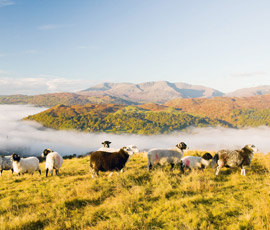CAP cash will go to farmers, Paterson pledges

A “Morris dancing filter” will ensure rural development schemes offer farmers and taxpayers value for money under CAP reform, according to DEFRA secretary Owen Paterson.
CAP reform schemes needed to be well-run, delivering benefits for the agricultural economy and the rural environment, Mr Paterson told delegates at a NFU fringe meeting during the Tory Party conference on 30 September.
Critics have blasted the CAP in the past for wasting taxpayers’ money by diverting farm support towards projects such as a canine therapy centre, a “surf bus” for beach goers, and a “lunar lift-off” family entertainment centre.
Mr Paterson, who plans to make farmers work harder for their money under CAP reform by diverting up to 15% of direct payments into rural development measures, said the same thing must not happen again.
“I am looking hard to put in a Morris dancing filter to make sure these schemes really benefit the agricultural economy,” Mr Paterson said. No decisions had yet been made – and there were strong opinions both ways – but DEFRA would take a balanced view on how CAP money was best spent, he said.
“You cannot survive on the hills in the Peak District or the Lake District by food production. There just isn’t the grass to sustain the concentration of livestock. But if you don’t have the livestock in the hills, no one is going to mend the stone walls or shoot the carrion crows.”
Owen Paterson, DEFRA secretary.
It was vital to remember subsidies were funded by taxpayers, Mr Paterson told listeners at Manchester Town Hall. “We are going to spend a shed load of public money every year – £3,500m – and the public are wondering what they are going to get for it.”
Better targeted schemes would enable farmers to look taxpayers in the eye and show they were getting value for money. Agri-environment schemes, for example, delivered public benefits by enhancing the landscape – and helped sustain a £33bn rural tourism industry.
“You cannot survive on the hills in the Peak District or the Lake District by food production,” said Mr Paterson. “There just isn’t the grass to sustain the concentration of livestock. But if you don’t have the livestock in the hills, no one is going to mend the stone walls or shoot the carrion crows.”
Mr Paterson’s comments were given a cautious welcome by Exmoor hill farmer Robin Milton. He said: “If we are going to have 15% modulation, let’s make sure the new environmental land management scheme is properly targeted with the right options.”
Mr Milton chairs the NFU’s Hill and Uplands Group, which has sometimes found itself at odds with the union’s official policy on CAP reform. Rather than having a place on the union’s council, which sets NFU policy, the hill group feeds its views into the NFU’s livestock board.
NFU livestock board chairman Charles Sercombe said: “We are in a better place than we were six months ago because DEFRA is recognising that hill farmers can’t get everything they need from the market place. But it is still important for upland producers to be as market-orientated as they can.”
Read more news and features on CAP reform
